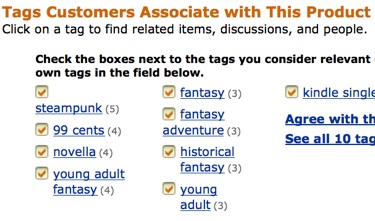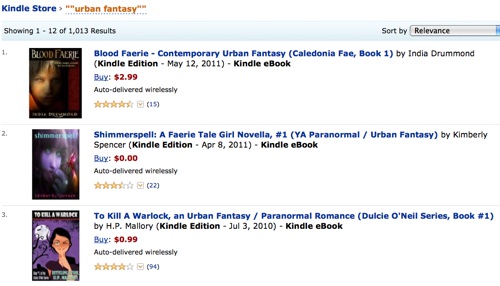 The other day, I blogged about how Amazon starts to promote your books internally once you sell enough copies to get on their map. Today I want to talk about tagging and the role it may or may not play in increasing sales.
The other day, I blogged about how Amazon starts to promote your books internally once you sell enough copies to get on their map. Today I want to talk about tagging and the role it may or may not play in increasing sales.
If you’re not sure what I’m talking about, check the bottom of any Amazon book page. People can “tag” a book with terms such as steampunk, paranormal romance, mystery, thriller, space opera, etc.. Amazon uses this information to help place a book in its search results (it may play a role in what Amazon chooses to display for personalized recommendations too).
Will tags help me sell more books?
The short answer is… not by themselves, no.
Based on my experience with my own books and some very official and very thorough observations (AKA fifteen minutes of typing in various search terms and looking at book pages), tags seem to play a small role in the big picture of how Amazon ranks search results for various terms.
For an uncompetitive term, tags may help you appear on the first page of search results. For more competitive terms, you probably won’t see a move up the results unless other factors are in your favor as well. (I’ve seen lots of examples where authors have done tag exchanges with other authors and have 100-odd votes for their chosen terms, but their books appear nowhere on the early pages of results.) The top results for competitive terms tend to be 1) popular 2) tagged and often 3) have the tag/keyword in the title.

There are exceptions, and some of them are downright puzzling (hey, Amazon wouldn’t want to make its search engine too transparent, or authors would have an easier time manipulating it), but, in the areas I checked, four out of five top results would follow that pattern.
So, are tags worth worrying about?
Personally, I don’t. I actually have some pretty strange ones on my earlier books thanks to, well, it’s a long story, but they’re not terms that are applicable to the book or that would ever help it sell copies (since no one would search for those terms). The ones in the first picture are for Flash Gold. It ranks 12th for “steampunk” even with only a few votes for that tag. Maybe when it’s been around longer and has sold more copies, it’ll place higher, but I’m not going to try and get 100 tags for steampunk in the mean time.
It’s not that I don’t think tags can’t help a little; it’s more a personal aversion to doing anything that could be construed as gaming the system. I did search engine optimization as part of my day job for years, and I’ve seen a lot of people use tricks to rank highly in Google search results, and Google inevitably gets wiser with each update and things that work one month can get you penalized or even de-listed (essentially banned) down the road. I don’t know if Amazon’s search engine is quite as sophisticated (or vindictive), but I’m not willing to risk it.
But, as a bit of evidence that they probably do help… As I write this, my fantasy novel, The Emperor’s Edge, comes up 10th when you search for “steampunk” in the Kindle store — higher than Flash Gold which is more of a steampunk story and has the word steampunk in the title. That it ranks for that term has to be based on tags (and possibly reviews using the word), because I don’t use steampunk in the title or blurb (aside from its steam-age setting, it’s more high/heroic fantasy).
So, in summary, my research approach wasn’t entirely scientific (please let us know if your experience has led you to different opinions on the usefulness of tags), but I believe ranking highly for Amazon searches is a combination of sales ranking/sales history, keywords (tags) in the book title, tags submitted at the bottom of the page, and possibly the prevalence of the term in user reviews (that order would be my guess on what gets the most weight too). Again, I have found puzzling exceptions.
So, should you run a tagging campaign and try to get more votes for your preferred terms?
I’ve already shared my stance on that. It’s up to you if you want to try it. I’m not sure having 100 votes gives you any more weight than a more natural looking ten or twenty. I also don’t think the Amazon search box is the way most readers find books, so even being #1 for a term may not increase your sales noticeably. But, if you haven’t bothered tagging your own books at all, you might want to do so to set a precedent for reviewers who might be inclined to do it. (Note: if you have an account, go tag them in the UK and DE stores, too, as tags don’t carry over.)
Come back next week for the last post in this series, one on Amazon reviews.




Thanks for the unscientific but helpful research, Lindsay. I don’t know if tags have helped my non-fiction ebooks or not, but I try to add terms that aren’t necessarily in my titles just in case.
I really appreciate your note about Amazon UK and DE–I get a fair number of sales across the pond but never thought to add tags (or to even check the listings, to tell you the truth–there are only so many hours in a day).
I’ve seen folks obsessed with tagging on Goodreads and never really understood it. This sort of helped.
I know what tags are for. Good information. Like your research into the matter.
Wasn’t there something about Amazon having disabled tags on ebooks entirely for a while, because there were problems with authors gaming the system by tag trading?
Yeah, there was a time recently for a few weeks when Amazon got rid of tags altogether because of self-pubbed authors gaming the system. They made some changes and then put them back in.
Don’t know what those changes were, but probably a system to crack-down on gaming.
@Dave Yup, I didn’t learn about the UK/DE bit myself until recently. I haven’t made an account for the DE one yet, so I’m not sure what’s involved (I made a UK years back to order a book that wasn’t in the US Amazon store).
@Mary Glad it was useful. I always wonder if people are going to know what I’m talking about when I start blathering about search engine results.
@Anke and @Cathy I remember the feature disappearing for a few days, but I think folks were just speculating as to the cause (unless there’s a press release or something mentioning it somewhere?). I don’t remember oodles of tags being particularly effective in boosting a book’s visibility before that either.
If you check on to the Kindle Boards Forum, there are all sorts of threads about tagging and lots and lots of authors spend all their time “Like” and tagging each others’ books.
I wonder if that isn’t hurting the system.
I was wondering why you selected the steam punk tag. I thought Amy was involved with the choice… It’s been interesting to see the impact purchasing the emperors edge and the steam oink tag have had in my amazon recommendations.
@Dale Maybe just sucking up some of the authors’ time?
@Kim Haha, am I the outlier messing up your otherwise serious and cerebral recommendations?
Hi Lindsay,
This is about categories. I just had some fun with that aspect. Do you think as an Indie author, it is better to use that particular category, or stay in the main stream(so to speak) of things. I’m not sure if this is an advantage for indies or not. I studied the page(s) and it almost makes me feel like a them and us situation. The rankings tend to stay up there along with the paid figures almost straight across the board. However, there is a smaller selection in Indie ebooks, I think about 110. What is your opinion?
Aron Joice
Hi Aron,
Is there an “independent” category somewhere on Amazon? I haven’t seen it. I’d definitely want to be right alongside the mainstream books out there, in the genre that is most fitting, as that’s where most folks are going to be looking.
I may be misinterpreting your question though, so let me know if that’s the case. Thanks!